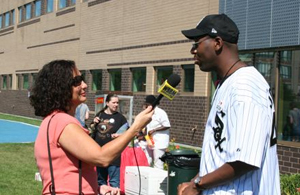by Beth Finke
After last night’s presidential debate, a post on a blog called Inside Autism wondered, “Does John McCain think autism and Down syndrome are the same thing? A lot of bloggers think so.”
That got me curious. After a bit of searching I found other blog posts on the subject, including this one from Brian Beutler’s Debate liveblog:
John McCain says Sarah Palin knows a lot about having children with autism. Presumably he thinks she knows more about this than anybody in the country. Presumably he also thinks autism is approximately equal to Down Syndrome.
If you missed the debate, here’s what happened. When Sen. McCain [R – AZ] was asked whether his running mate was qualified, he said:
She’ll be my partner. She understands reform. And, by the way, she also understands special-needs families. She understands that autism is on the rise, that we’ve got to find out what’s causing it, and we’ve got to reach out to these families, and help them, and give them the help they need as they raise these very special needs children.
She understands that better than almost any American that I know.
I, for one, am willing to give McCain the benefit of the doubt on this one. I’m guessing he meant Palin understands autism because her baby son has special needs (he has Down Syndrome), plus her sister has a child with autism.
Sen. Obama [D – IL] used a question about the budget to address the autism issue.
I do want to just point out that autism, for example, or other special needs will require some additional funding, if we’re going to get serious in terms of research. That is something that every family that advocates on behalf of disabled children talk about.
And if we have an across-the-board spending freeze, we’re not going to be able to do it. That’s an example of, I think, the kind of use of the scalpel that we want to make sure that we’re funding some of those programs.
My Easter Seals colleague, Katy Beh Neas, was downright clairvoyant when she blogged last year about how autism would turn out to be an issue in the presidential campaign. Messages about the care and treatment of people living with autism and other special needs can now be found side-by-side with messages about foreign policy, our economy and global warming. Who would’ve guessed?
I’ll leave you with my favorite blog quip about autism from last night’s debate. It comes from Matthew Baldwin, author of the blog Defective Yeti. I’ve referred to Defective Yeti in an Easter Seals autism blog post before. After Baldwin’s son was diagnosed with Autism Spectrum Disorder (ASD), Defective Yeti started featuring posts about autism from time to time (in addition to the posts Baldwin already publishes on politics, movies and the like).
Only one sentence from Baldwin’s liveblog of the debate last night mentions autism, but I think that one sentence is brilliant.
6:40: At what point did “autism” become the center square on the Political Bingo card?








